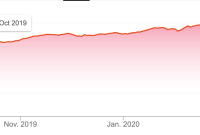Support strong Canadian climate journalism for 2025
Businesses of any size that have seen sharp and sudden drops in revenues due to COVID-19 will be eligible for a new federal wage subsidy program, the federal government said Monday, just as it signalled more help for some of the country's major employers.
The 75-per-cent subsidy on wages meant to cushion the blow from the pandemic will be available to employers that can show their revenues have fallen by at least 30 per cent due to COVID-19. It will be capped at $847 a week, backdated to March 15, and the number of workers a company or other organization employs won't be a factor.
The plan has grown from a 10 per cent wage subsidy directed at small businesses to a broad, deep, expensive support program to keep workers on employers' payrolls even if the work isn't there to support them.
As the Liberals announced last week, the program is to run for three months.
Many of the details are supposed to be supplied Tuesday by Finance Minister Bill Morneau, who is under pressure to provide help to airlines as well as the oil and gas sector.
Legislation approved by Parliament last week gives the federal government latitude to spend as necessary to help keep companies from going under — even if they have gone dormant due to COVID-19 — while economic activity is curbed over public-health concerns.
Deputy Prime Minister Chrystia Freeland demurred on what may come when asked if the Liberals would consider claiming ownership stakes in companies similar to what governments did for the big automakers during the recession just over a decade ago.
During a midday press conference, Freeland said she wasn't "going to pre-empt future announcements."
"We very much understand that particular sectors of the economy, whether it is tourism and aviation, or the energy sector, are facing particular strains because of the impact of the coronavirus both in Canada and worldwide," she added.
"We are very mindful of that and it is something that we are definitely focused on."
Prime Minister Justin Trudeau pointed to his government's wage-subsidy program as one way to help businesses. He said the size of the company or the number of employees will not bear on whether it qualifies for the help, in line with what other countries have done.
Speaking outside his Ottawa residence, Trudeau asked companies that get the subsidy to rehire workers laid off over the last two weeks, and ensure all the money through the program goes to employees.
"We are trusting you to do the right thing. If you have the means to pay the remaining 25 per cent that's not covered by the subsidy, please do so," Trudeau said.
"And if you think this is a system you can take advantage of or game, don't. There will be serious consequences for those who do."
He said the program will have to rely in some measure on employers sticking to the honour system when applying for help, but added there will be an oversight system.
The plans unveiled Monday came after days of criticism from a broad swath of business and labour groups over the original proposal of a 10 per cent subsidy, which they said fell well short of what was needed to avoid mass layoffs.
The federal bailout package to date is now valued at more than $200 billion, including $52 billion in direct spending, $85 billion in tax deferrals for individuals and businesses, and $65 billion in loans. Last week, TD Economics estimated the increased wage subsidy could add $25 billion in direct spending to the total.
Providing the wage subsidy to companies of all sizes that experience a decline in revenue should help prevent further layoffs and provide much-needed relief to employers and employees, said Goldy Hyder, CEO of the Business Council of Canada.
Dan Kelly, president of the Canadian Federation of Independent Business, said in a statement that keeping administrative requirements light should ensure support can get quickly to the businesses that need it.
Both groups said they would be looking for more details, including whether there will be a cap per employer over the duration of the program.
"The decisions to make the wage subsidy widely available to employers of all sizes and structures is the right approach given the unique nature of the COVID-19 pandemic," Kelly said in a statement.
"The wage subsidy is the single best measure to help Canada prepare for a quick recovery the minute the emergency phase of the pandemic is over."
But the CFIB also warned Monday that financial issues for other businesses are mounting. The organization suggested that one in five small and medium-sized businesses remain open during the economic shutdown linked to COVID-19, while two in five are worried about having to permanently close.
The CFIB suggests one-quarter of its members don't think they can cover some of their fixed costs, such as rent and leases, for April, based on a survey of its members over the weekend.
Trudeau didn't say if the government is going to help with those costs, only that the Liberals will listen to businesses and non-profits that have problems and try to address them.
This report by The Canadian Press was first published March 30, 2020.





Comments